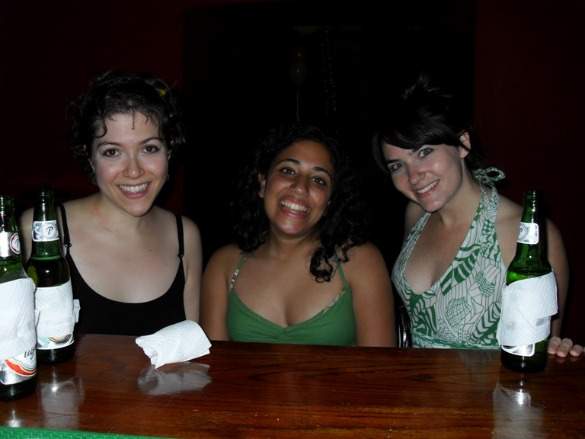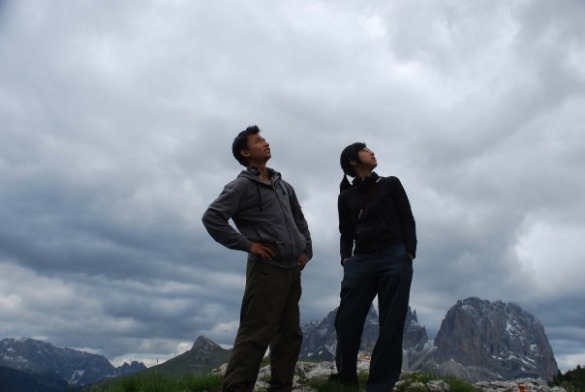Nearly everything I know about keeping in touch, I learned from my Australian travel mate, Dave.
We only traveled together for about two weeks, but somehow I found myself playing host to him in New York City a year later. How? Through what Dave calls the “traveling circus.”
Whether your goal is to build a network of couches to crash on (like Dave) or simply to keep in touch with contacts who can show you around foreign cities, help with research projects, share local insight, and, well, be your friends – the trick is mastering exactly how to keep in touch with the right people and what to expect.
Everywhere Dave goes, he collects friends. All of his friends around the world, collectively, form his “traveling circus.”
I eventually lost touch with the German girl we met in the hostel in Prague, but Dave didn’t. As a result, he has an open invitation to Frankfurt.
And Toronto, and New York, and everywhere else his travel contacts live. Is he best friends with all of us? Nope. But, would we offer up our couches to him? In a heartbeat.
Here are the top six things you need to know in order to create a traveling circus of your own.
1. Keeping in touch with friends made on the trail.
You’re probably familiar with this scene:
You arrive in Rome (or Munich or Bangkok or another place you’ve been meaning to visit for years), plop your oversized backpack onto a local dorm’s twin-sized bed, and meet the neighbors. You start talking to the other backpackers, find out that you share a common connection in London, and the friendships grow from there. You travel together for the next three days straight – and then you part ways.
Keeping in touch:
It’s easy not to follow through after that, since you did meet only for three days. But, remember that you’ve shared the incredible experience of exploring a new place.
Start by becoming Facebook friends. Nearly everyone I’ve met is on Facebook, whether they’re French, Japanese or, alas, Australian.
You’re not expected to become best friends overnight or even at all, but the key is to keep the lines of communication open. Aim to shoot a Facebook message to your travel mates twice per year. It can be short: “Hey, how’ve you been?” There’s nothing in particular that you need to say. Your primary goal is to make sure that you remember each other now and in the future.
What to expect:
Some travel mates will issue an open invitation to visit someday. To make sure that the offer is genuine, let your travel friend know that you’ll be in town, see if you can arrange a time to hang out, and wait for him or her to offer.
Unless you became close friends in the interim, don’t be any pushier than a half-serious joke about their offer to host you.
If your friend doesn’t jump at that, then don’t force the issue. If the offer to host was real, don’t forget to bring wine, flowers, or souvenirs from the last place you visited.
2. Visiting old friends in foreign cities.
Whether your childhood friend got married and moved to India or your cousin is studying abroad in Barcelona, it’s great to have connections. If, however, it’s been two decades since you spoke to that friend from third grade, it’s tacky to reconnect for the first time a mere week before you ask to crash at his place.
Keeping in touch:
Whether this means exchanging holiday cards or calling each other a couple of times per year, your connection is only as strong as you make it. One of my old friends from high school recently found me on Twitter and reached out. Although we haven’t spoken in years, I’m glad he did!
What to expect:
Friendship.
Your expectations should vary according to your closeness to this person. Even if you haven’t seen someone in many years, you can hope to catch up over a drink and maybe have the person show you around town. Don’t count on an offer of accommodations, though; their answers will depend on their circumstances. If your old classmate is married and your cousin is living with a host family, an offer of accommodation might not be reasonable.
Moral of the story: Expect to reconnect with someone you care about. If all you’re looking for is a place to crash, don’t bother.
3. Maintaining contact with former couch-surfers.
Whether you’ve gone through a website like CouchSurfing.com or simply let a friend-of-a-friend stay in your living room for a couple of days, a unique link is created whenever someone opens up his or her home.
Keeping in touch:
Regardless of how close you were to your visitor before she stayed with you, there’s now a special bond (unless the experience was negative). Aim to drop her a quick line once or twice per year. Even if you fall a bit out of touch, you’ll have free reign to reconnect when you’re planning a trip to her hometown. Your relationship with this person is already built entirely around giving and receiving.
What to expect:
I couchsurfed through Europe a couple of years ago, and if any of my former hosts were in New York, I would feel the need to be hospitable.
Just remember that hosting is a commitment: You might not have minded sharing your living room for two days, but your former guest who lives in Shanghai might have more qualms about sharing her tiny bedroom. Have an honest discussion about it. At the least, you can expect this person to grab drinks and show you around town, but don’t approach the situation with a sense of entitlement. Also, regardless of whether you end up staying over, bring along a small gift or souvenir.
4. Researching or studying abroad.
When I was researching my senior thesis, I spent a few weeks in Kyoto interviewing clergy and professors. I don’t have any immediate plans to do more research in Japan, but who knows what the future holds? I make an effort to keep in touch with local professors and research companions —whether looking for advice, recommendation letters, or support for future projects, the key is not to lose touch entirely.
Keeping in touch:
You aren’t going to tell that professor about your relationship or favorite restaurant, and keeping in touch will be almost entirely your burden. Don’t become self-conscious about making all the effort. People in academia are used to rekindling old work connections, and every professor I’ve known has relished hearing about what past students are up to.
Keep these correspondences brief, share what you’ve been doing for your professional and/or intellectual pursuits, and don’t message more than two or three times per year unless you have something specific to say.
What to expect:
Nothing, in the short-term sense. Cultivate a long-term relationship so that you have a solid contact for other opportunities, future research, letters of recommendation, and – most importantly – advice.
5. I dare you: create your own traveling circus.
You don’t have much to lose by reaching out to people you’ve lost touch with. Be polite, acknowledge that it’s been a long time, and show the person that you value her friendship and would love to reconnect. Not only might you find someone willing to show you around town or offer up a place to stay the next time you visit, but you’ll reconnect with old friends and rekindle relationships that can enrich your life, and your travels.
Do you try to keep in touch with friends you’ve made on the road? Share your tips for building your own “traveling circus.”

Photos by: 1- Jeff Bauche, 3- Merlijn Hoek, 4- lodge28, 5- David Miu (with permission), all others courtesy of the author and may not be used without permission




